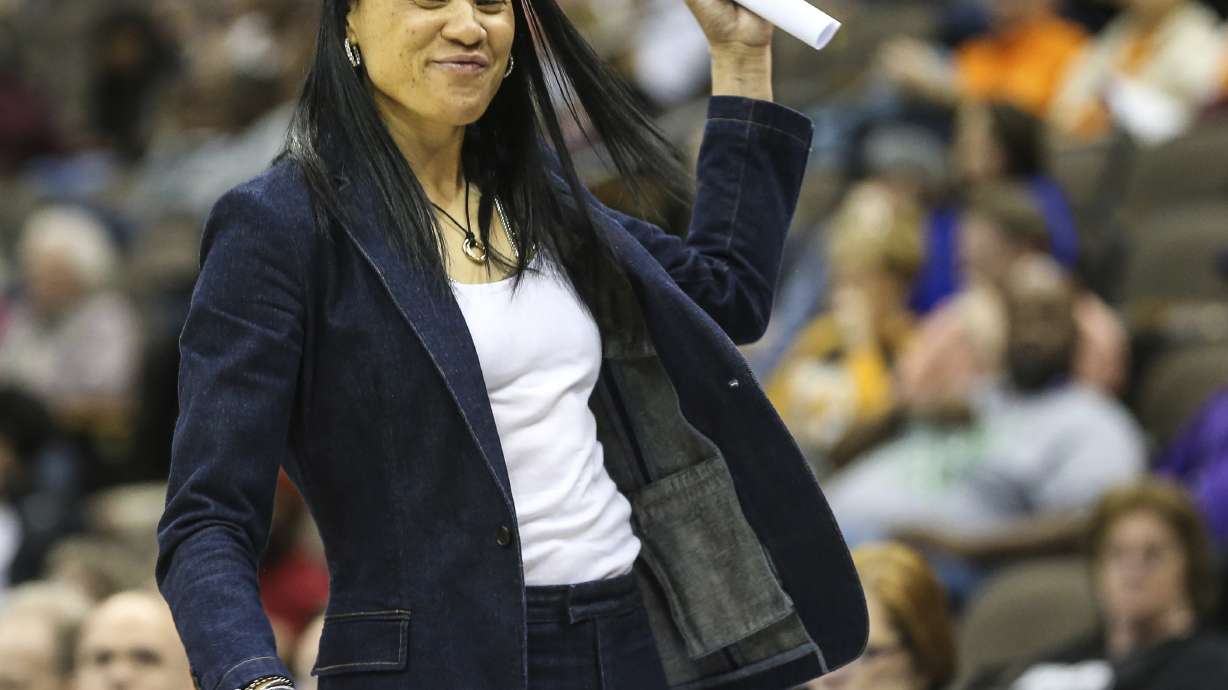Estimated read time: 4-5 minutes
This archived news story is available only for your personal, non-commercial use. Information in the story may be outdated or superseded by additional information. Reading or replaying the story in its archived form does not constitute a republication of the story.
COLUMBIA, S.C. (AP) — For more than 15 years, the state of South Carolina stood on the sidelines watching as big-time, postseason basketball passed it by.
Now, the Palmetto State is preparing to show its stuff. While the return was borne from the shooting deaths of nine parishioners at Charleston's Emanuel AME Church that spurred the removal of the Confederate flag from Statehouse grounds, those in the state who love hoops are eager to make its comeback a success.
"The rest of the country is going to see what South Carolina has to offer," Gamecocks women's basketball coach Dawn Staley said.
Things start next week when the Atlantic Coast Conference and Southeastern Conference hold their women's basketball tournaments in the state, the ACC in Conway, close to Myrtle Beach, and the SEC in Greenville.
A few weeks later, Greenville's Bon Secours Wellness Arena will host the first and second rounds of the men's NCAA Tournament, something it last did in 2002 — and was accompanied by a NAACP protest march that urged people to "Don't stop, don't shop, 'til the flag drops."
The Colonial Athletic Association plays its men's basketball tournament at the home of recent member College of Charleston.
And Staley's team, despite a late-season slide, including two losses in the past two weeks, is likely to host first- and second-round games in the women's NCAA Tournament — making it a March chock full of madness like hadn't been seen here in years.
"We're ready," said Duane Parrish, director of the state's parks, recreation and tourism department.
South Carolina was banned by the NCAA in 2001 from holding pre-determined championships like men's basketball after its legislature moved the Confederate flag, which had been flying atop the Statehouse, to a Confederate soldier's monument on the grounds, which critics said made the banner even more visible than before.
Major conferences like the ACC and SEC largely followed the NCAA's lead in keeping prominent title games out of the Palmetto State.
State lawmakers and leaders were content to let the flag issue lie, and postseason basketball remained out of reach.
It took Dylann Roof killing nine black churchgoers at a Bible study in June 2015 to get then-Gov. Nikki Haley and the legisture to take down the Confederate flag, a symbol Roof waved in pictures.
In December, a federal jury convicted Roof of murder. He was sentenced to death last month.
"From a horrific tragedy, something good has come," Staley said. "The Charleston Nine, obviously we feel for their families and what happened. But at least it wasn't all in vain."
Once the flag came down in July 2015, the NCAA withdrew its prohibitions against South Carolina.
Parrish said his department quickly met with NCAA leaders to make sure they knew their state would be open for business. He believes arenas in Columbia and Greenville are positioned well for when the NCAA awards venues in its next tournament cycle of 2019-2022. "I would think one or both sites will be used," he said.
Clemson coach Brad Brownell said having the NCAA Tournament back in the state is a selling point to recruits who may have grown up hearing from other coaches about the ban. "It's something we don't have to worry about these days," he said.
South Carolina was helped by neighboring North Carolina, which passed a law limiting protections for LGBT people and lost numerous sporting events as a result . The NCAA men's regional in Greenville was originally set for Greensboro, North Carolina. The ACC women's tournament was to be played there, too, until the league switched to South Carolina.
"You never want to benefit from someone else's misfortune," Parrish said. "But it is an opportunity."
Parrish gets asked all the time how much the NCAA ban cost the state in lost revenue. "That's impossible to say. Certainly in the tens of million, could be in the hundreds of millions," he said. "Now, we're in the game."
And many think it will stay that way for years to come.
South Carolina men's basketball coach Frank Martin said he's seen a progressive, open state since moving here in 2012, one that got lost amid talk of the Confederate flag and the NCAA ban in years past. "We get to host an NCAA tournament," Martin said. "I think that's a powerful statement of where we are."
Copyright © The Associated Press. All rights reserved. This material may not be published, broadcast, rewritten or redistributed.








